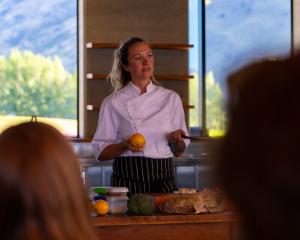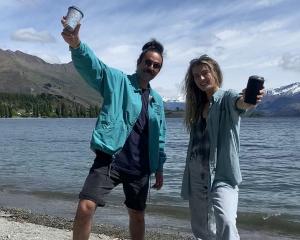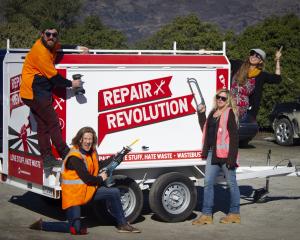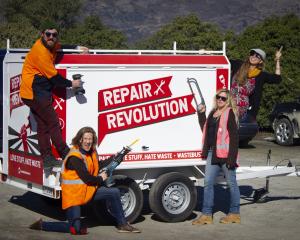Reducing waste and mitigating climate change can deliver near instant gratification.
The recent storms in the North Island have really brought home the financial and emotional chaos that climate change creates.
As a nation, our concern about the impacts of climate change is growing, while confidence in our ability to cope is dropping, according to a Consumer NZ survey released last week.

"Less than a quarter of the population think New Zealand is well equipped to adapt to the impact of climate change," Jon Duffy, Consumer NZ chief executive, said.
That’s not good news, especially when each flood and extreme weather event is hugely costly. Paying for the clean-ups cuts into our capacity to pay for new systems and infrastructure that will help prevent further climate change. It’s like life with really bad flatmates, you just get over cleaning up one mess before there’s another massive party in the living room

If you are looking for cheap and popular wins, introducing a container return scheme (CRS) for the recycling of drink containers has to be at the head of the queue. Under a container return scheme, you get a deposit of, say, 20c returned when the drink container is recycled. Yes, it’s exactly what we had back in the ’70s, when kids used the returned deposits to buy lolly bags, and community groups used them to fundraise.
The evidence is incontrovertible that container return schemes for drink containers achieve phenomenally high recycling rates and extremely high-quality recycling. And we know we are not getting those results in Aotearoa now. We are only recycling 45% of our drink containers. More than 1.7 billion drink containers are littered, stock-piled or go to landfill every year. What a waste of money, resources and energy!
Last month, Fair Go revealed the dirty secrets of public-place mixed recycling (to be clear, we are talking about public-place recycling, such as bins in the middle of towns, not kerbside bins). They discovered that the vast majority of recycling from public mixed-recycling bins goes to landfill, including 100% of Auckland’s public mixed recycling. (Dunedin City Council had one of the lowest reported rates of 15% going to landfill). Public recycling was also up to eight times more expensive than kerbside recycling, at $1700-$5700 per tonne. It’s excellent to see councils being transparent about the failure of public mixed recycling, because then we can transition to a better recycling system.

But how does better recycling help reduce climate change? Well, it’s as simple as this: each "thing" we make causes greenhouse gases to be emitted, though extraction, production and transportation. Keeping the "thing" in circulation either through reuse or recycling, reduces the greenhouse gas emissions it takes to make a new "thing". Many drink containers are made from aluminium or glass, both of which are extremely energy intensive to manufacture from virgin materials.
A report from Circularity Gap in 2021 found that if we double the circularity of the global economy from 8.6% to 17% (in addition to existing climate commitments) we could keep warming within 2degC. That gives me hope.
New technology systems, such as CLYNK, which operates in Maine and other "Bottle Bill" states in the US, are making it easier than ever to get deposits back. Getting your money back is as simple as dropping bags of recycling off and seeing your return money loaded onto a card. That kind of system would fit seamlessly into people’s normal routines of popping into zero-waste hubs such as Wastebusters, or supermarkets.
Doing practical small things at a local scale is the only way to get us all involved in the climate transition. A CRS brings ways to participate and ways to innovate and it can be a stream of funding for zero-waste hubs that combine recycling and reuse with education and engagement.
Last month, Wastebusters was gutted to announce that we will have to close our Alexandra reuse shop and Alexandra recycling centre on June 30 this year (we will be continuing our Wanaka operations). The Alexandra site was not financially viable for Wastebusters to continue to operate, and while the closure was due to a combination of factors, the Government’s decision to delay the introduction of a CRS was one of them. We just couldn’t hang on any longer.
The messages of support we’ve had from the Central Otago community have been both heart-warming and heart-breaking. They’ve shared so many stories about the way that Wastebusters has made it easier for them to live more cheaply and with less waste, and how much they will miss having a local zero-waste hub. That makes it even harder to close the doors at Alexandra. With the challenges that climate change is already bringing, we will need more local solutions and resilience, not less.

Two things you can do to encourage a container return scheme:
• Make it an election issue. Ask your local candidates to commit to a CRS for drink containers in the first 100 days to improve our recycling returns from 45% to more than 85%.
• Join the Message in a Bottle campaign. Flatten a clean plastic drink bottle (2mm or thinner), put it in an envelope with a message about why you want a CRS and send it to the Prime Minister Freepost (you don’t need a stamp). PM Hon Chris Hipkins, FreePost Parliament, Private Bag 18888, Parliament Buildings Wellington 6160.
Gina Dempster is Wastebusters resource recovery manager.












